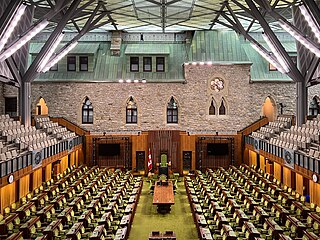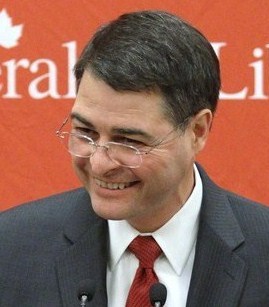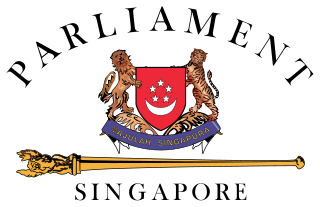Related Research Articles

The House of Commons is the lower house of the Parliament of the United Kingdom. Like the upper house, the House of Lords, it meets in the Palace of Westminster in London, England. The House of Commons is an elected body consisting of 650 members known as members of Parliament (MPs). MPs are elected to represent constituencies by the first-past-the-post system and hold their seats until Parliament is dissolved.

The House of Commons of Canada is the lower house of the Parliament of Canada. Together with the Crown and the Senate of Canada, they comprise the bicameral legislature of Canada.
The Intelligence and Security Committee of Parliament (ISC) is a statutory joint committee of the Parliament of the United Kingdom, appointed to oversee the work of the UK intelligence community.

The speaker of the House of Commons is the presiding officer of the House of Commons, the lower house and primary chamber of the Parliament of the United Kingdom. The current speaker, Sir Lindsay Hoyle, was elected Speaker on 4 November 2019, following the retirement of John Bercow. Hoyle began his first full parliamentary term in the role on 17 December 2019, having been unanimously re-elected after the 2019 general election.

The House of Representatives is the sole chamber of the New Zealand Parliament. The House passes laws, provides ministers to form Cabinet, and supervises the work of government. It is also responsible for adopting the state's budgets and approving the state's accounts.

The speaker of the House of Commons is the presiding officer of the lower house of the Parliament of Canada. A member of Parliament (MP), they are elected at the beginning of each new parliament by fellow MPs. The speaker's role in presiding over Canada's House of Commons is similar to that of speakers elsewhere in other countries that use the Westminster system.

In New Zealand, the speaker of the House of Representatives, commonly known as the speaker of the House, is the presiding officer and highest authority of the New Zealand House of Representatives. The individual who holds the position is elected by members of the House from among their number in the first session after each general election. They hold one of the highest-ranking offices in New Zealand. The current Speaker is Adrian Rurawhe who was elected on 24 August 2022.

The Parliament of Singapore is the unicameral legislature of the Republic of Singapore, which governs the country alongside the president of Singapore. Largely based upon the Westminster system, the Parliament is made up of Members of Parliament (MPs) who are elected, as well as Non-constituency Members of Parliament (NCMPs) and Nominated Members of Parliament (NMPs) who are appointed. Following the 2020 general election, 93 MPs and two NCMPs were elected to the 14th Parliament. Nine NMPs will usually be appointed by the president.
The Committee of Public Accounts is a select committee of the British House of Commons. It is responsible for overseeing government expenditures, and to ensure they are effective and honest. The committee is seen as a crucial mechanism for ensuring transparency and accountability in government financial operations, having been described by Professor the Lord Hennessy as "the queen of the select committees...[which] by its very existence exert[s] a cleansing effect in all government departments".
The Public Administration and Constitutional Affairs Select Committee, formerly the Public Administration Select Committee, is a select committee appointed by the British House of Commons to examine the reports of the Parliamentary and Health Service Ombudsman, and to consider matters relating to the quality and standards of administration provided by civil service departments, and other matters relating to the civil service, mostly for England and Wales, and constitutional affairs.

The Independent Parliamentary Standards Authority (IPSA) is a public body in the United Kingdom created by the Parliamentary Standards Act 2009, largely as a response to the parliamentary expenses scandal of 2009. It establishes and monitors the expenses scheme for Members of the House of Commons, and is responsible for paying their salaries and expenses. Following revisions to the Parliamentary Standards Act in April 2010, IPSA was also given responsibility for setting the level of MPs' salaries.
The basic annual salary of a Member OF Parliament (MP) in the House of Commons is £84,144, as of April 2022. In addition, MPs are able to claim allowances to cover the costs of running an office and employing staff, and maintaining a constituency residence or a residence in London. Additional salary is paid for appointments or additional duties, such as ministerial appointments, being a whip, chairing a select committee or chairing a Public Bill committee.
The Members' Expenses Committee, until July 2011 called the Members' Allowances Committee, was a select committee of the British House of Commons, the lower house of the United Kingdom Parliament. The committee advises the Members Estimates Committee and the Leader of the House of Commons on any potential developments in the allowances system for members of the Commons.
The House of Commons Commission is the overall supervisory body of the House of Commons Administration in the United Kingdom. The Commission is a corporate body established by the House of Commons (Administration) Act 1978 (c.36). The Commission continues to exist during the dissolution period and the person who was Speaker continues in office as a member of the Commission until a Speaker is chosen by the new Parliament.

Bridget Maeve Phillipson is a British politician serving as Shadow Secretary of State for Education since 2021. A member of the Labour Party, she has been Member of Parliament for Houghton and Sunderland South since 2010. She served as Shadow Chief Secretary to the Treasury from 2020 to 2021.
The Speaker's Committee on the Electoral Commission (SCEC), or simply the Speaker's Committee, is a body created under the Political Parties, Elections and Referendums Act 2000 to scrutinise the Electoral Commission. Through the committee's members, the commission is able to field questions in the House of Commons in a manner similar to the way ministers do.

The House of Lords Reform Bill 2012 was a proposed Act of Parliament of the United Kingdom introduced to the House of Commons in June 2012 by Nick Clegg. Among other reforms, the bill would have made the House of Lords a mostly elected body. It was abandoned by the British Government in August 2012 and formally withdrawn on 3 September 2012, following opposition from within the Conservative Party.
The Commons Select Committee on Standards is appointed by the House of Commons to oversee the work of the Parliamentary Commissioner for Standards.

His Majesty's Most Loyal Opposition, commonly known as the Official Opposition in the United Kingdom, is the main political opposition to His Majesty's Government. This is usually the political party with the second-largest number of seats in the House of Commons, as the largest party will usually form the government. Since May 2010, the Official Opposition has been the Labour Party, led by Sir Keir Starmer since 2020.

The European Research Group (ERG) is a research support group and caucus of Eurosceptic Conservative Members of Parliament of the United Kingdom. The journalist Sebastian Payne described it in the Financial Times as "the most influential [research group] in recent political history".
References
- ↑ Parliamentary Standards Act (c. 1) Schedule 1, s 22.
- ↑ Parliamentary Standards Act (c. 1) Schedule 1, s 2.
- ↑ Parliamentary Standards Act (c. 1) Schedule 3
- ↑ "Speaker's Committee for the Independent Parliamentary Standards Authority - Membership - Committees - UK Parliament". committees.parliament.uk. Retrieved 12 January 2022.